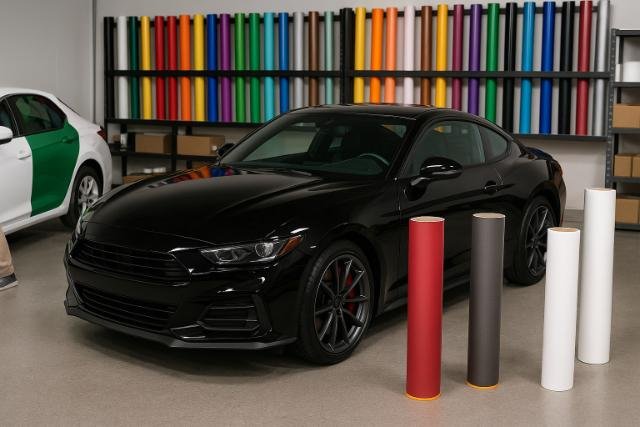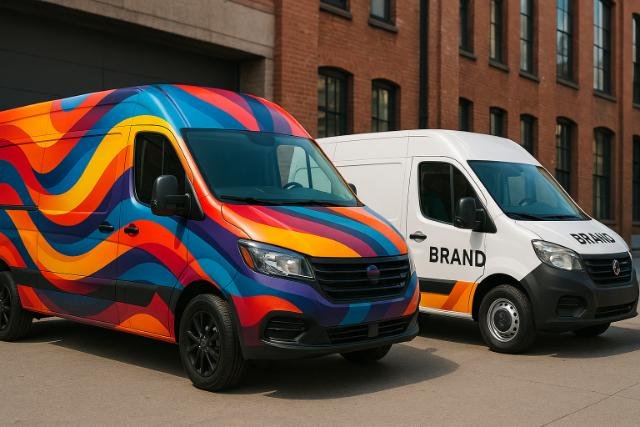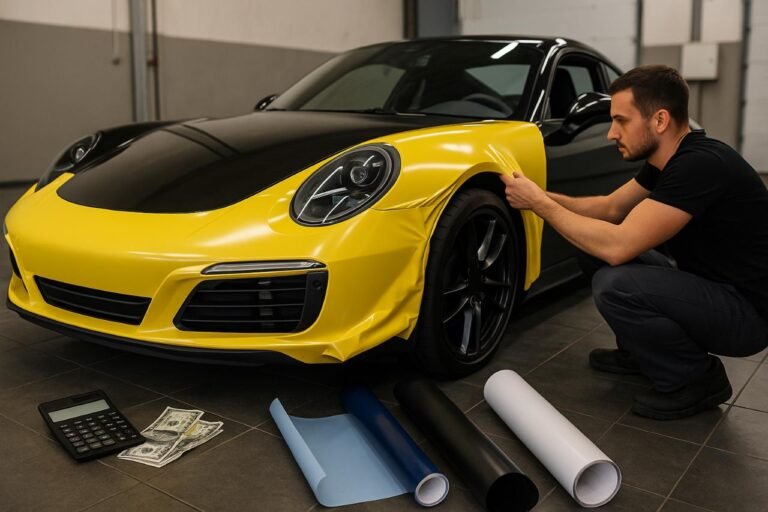Car wraps have become one of the most popular ways to give vehicles a fresh, customized look without going through the hassle and expense of repainting. Whether you want to protect your car’s original paint, advertise your business, or simply change its appearance, understanding how much it costs to wrap a car is crucial before starting. Car wraps offer a versatile and reversible solution, allowing drivers to switch styles whenever they wish. This comprehensive guide explores all the cost factors that influence vehicle wrap pricing, including size, materials, labor, and long-term maintenance, to help you make an informed decision that suits your goals and budget.
Determine the Average Cost Range for Different Vehicle Types
The size and type of your vehicle have a significant influence on the total cost of a car wrap. The larger the vehicle, the more vinyl material and labor hours are required. A compact car will always be more affordable to wrap than a full-size truck or SUV simply because less surface area needs to be covered. On average, car wrap prices range between 2000 and 6000 dollars for most personal vehicles. However, luxury models or complex projects can easily go above 10000 dollars due to additional design or detailing work.
When wrapping a small sedan, you can expect to pay around 2000 to 3000 dollars, depending on the finish. A midsize SUV usually costs 3000 to 4500 dollars. Pickup trucks or vans, which have larger and often more irregular surfaces, can range from 4000 to 5500 dollars. Sports or exotic vehicles such as Ferraris, Porsches, or Teslas often cost between 5000 and 10000 dollars because of the intricate curves and precision required for installation.
Different finishes also contribute to the price differences. For instance, chrome wraps are the most expensive because of their reflective quality and fragile nature, which require meticulous handling. Matte or gloss finishes tend to be more affordable, while color-shifting or textured wraps fall in the mid-range.
Cost Comparison by Vehicle Type
| Vehicle Type | Average Cost Range | Material Required | Installation Time |
| Compact Car | 2000–3000 USD | 50–60 ft vinyl | 1–2 days |
| SUV | 3000–4500 USD | 70–80 ft vinyl | 2–3 days |
| Truck | 4000–5500 USD | 90–100 ft vinyl | 3–4 days |
| Sports Car | 5000–10000 USD | 60–70 ft vinyl | 2–4 days |
Factors That Increase the Cost of Car Wraps
Several factors can increase the cost of a wrap. These include the complexity of the car’s body shape, the number of curves or deep recesses, and the choice of premium materials. If you opt for a custom graphic or brand logo, the price can rise significantly due to additional design and printing time. The level of surface preparation required also matters; cars that need cleaning, polishing, or rust treatment before wrapping will add to the total cost.
Choose the Right Wrap Material for Your Budget and Goals

Selecting the right type of vinyl material is one of the most important decisions in determining how much it costs to wrap a car. The quality of the vinyl affects not only the appearance but also the durability and ease of maintenance. Most car wraps use high-performance vinyl from well-known manufacturers such as 3M, Avery Dennison, or Oracal.
Basic gloss or matte wraps are the most budget-friendly, typically costing 8 to 10 dollars per square foot. These wraps give the car a smooth and modern look. Satin wraps, which combine elements of both matte and gloss finishes, are slightly more expensive and offer a refined appearance. Specialty finishes such as metallic, brushed aluminum, or color-shifting wraps can range from 12 to 20 dollars per square foot. Chrome wraps are the most premium option, costing between 25 and 30 dollars per square foot due to their unique reflective surface and difficulty of installation.
Types of Vinyl Wrap Finishes
| Finish Type | Price per sq. ft | Appearance | Durability |
| Gloss | 8–10 USD | Shiny and reflective | 5–7 years |
| Matte | 8–12 USD | Smooth, non-reflective | 4–6 years |
| Satin | 10–14 USD | Semi-gloss with soft shine | 5–7 years |
| Chrome | 25–30 USD | Mirror-like and bold | 2–3 years |
Best Material Options for Long-Term Use
For drivers who want a wrap that will last many years, cast vinyl is the best option. Cast vinyl is more flexible and durable compared to calendered vinyl, allowing it to conform easily to curves and edges without shrinking or cracking. Cast vinyl can last up to seven years under normal conditions. Calendered vinyl, on the other hand, is thicker and less pliable. It generally lasts three to five years and is ideal for short-term applications or partial wraps where cost savings are important.
Evaluate Labor and Installation Costs from Professional Shops
Labor charges form a large part of the total wrap cost. Professional installation ensures that the vinyl is applied smoothly and without bubbles, wrinkles, or misalignments. Skilled installers also handle complex areas such as door handles, mirrors, and bumpers with precision. On average, labor accounts for 40 to 50 percent of the total project cost.
Most wrapping professionals charge between 75 and 150 dollars per hour depending on their experience and the location of the shop. High-end shops with specialized tools or a strong reputation may charge more. The installation process typically takes one to four days depending on vehicle size, wrap complexity, and drying time.
Factors That Influence Labor Pricing
Labor costs depend on how many installers are assigned to the project, how much surface cleaning is needed before application, and whether certain car parts need to be removed for better coverage. Some professional shops disassemble trim pieces, bumpers, and headlights to achieve a perfect edge finish, which adds to the overall labor cost but results in a superior appearance. Shops that employ certified installers, such as 3M Preferred Installers, may also charge premium rates because of their proven expertise.
DIY vs. Professional Installation
While it is possible to wrap a car yourself using DIY kits costing between 500 and 1500 dollars, professional installation generally delivers better and longer-lasting results. Improper wrapping techniques can lead to trapped air bubbles, uneven textures, or peeling edges. A poorly installed wrap not only looks unappealing but can also shorten the life of the vinyl. Therefore, professional installation is strongly recommended if you want your car wrap to look seamless and last for several years.
Include Additional Costs for Preparation and Aftercare
Apart from material and labor costs, there are several hidden or additional expenses associated with car wrapping that many people overlook. Before the wrap is applied, the car surface must be completely clean and free from debris, wax, or rust. This ensures proper vinyl adhesion and prevents imperfections from showing through the wrap. Many shops charge separately for cleaning, paint correction, or minor repairs before starting the wrapping process.
After installation, proper maintenance is crucial to keep the wrap looking new and to extend its lifespan. Regular cleaning and protection from the elements are essential to prevent fading, peeling, or staining. Investing in aftercare products and services can save money in the long term by maintaining the quality of the wrap.
Common Additional Expenses
| Service | Average Cost | Purpose |
| Surface Cleaning | 100–300 USD | Removes contaminants before application |
| Paint Correction | 200–600 USD | Smooths surface imperfections |
| Panel Removal | 150–400 USD | Allows wrap to cover hidden areas |
| Ceramic Coating | 300–800 USD | Adds protection and easier cleaning |
Ongoing Maintenance Tips
To preserve the finish, always wash the car by hand using mild, pH-neutral soap. Avoid automatic car washes that use brushes or high-pressure jets, as they can damage the vinyl. It is also recommended to park the car indoors or under shade to minimize UV exposure. Applying a ceramic coating or wrap-safe wax every few months helps maintain the color and protect the surface from contaminants.
Decide Between Full Wraps and Partial Wraps

One major decision that affects the total cost is whether you choose a full wrap or a partial wrap. A full wrap covers every visible exterior surface of the car, transforming the entire color and texture. This option is ideal for drivers who want a dramatic change or full paint protection. A partial wrap, however, covers only selected sections such as the roof, hood, mirrors, or doors, providing a stylish contrast or branded appearance at a lower cost.
Cost Comparison of Wrap Coverage Options
| Wrap Type | Coverage Area | Average Cost |
| Full Wrap | Entire exterior | 2500–6000 USD |
| Partial Wrap | 25–50% of surface | 1000–2500 USD |
| Accent Wrap | Mirrors, roof, or hood | 300–800 USD |
| Custom Graphic Wrap | Logos and decals | 500–1500 USD |
When to Choose Partial Over Full Wraps
Partial wraps are a great solution for budget-conscious owners who want to refresh their car’s appearance without a complete transformation. Businesses also use partial wraps for brand logos and promotional designs. A partial wrap is faster to install and easier to replace or modify later. For those who want both affordability and creativity, combining multiple vinyl colors or textures in a partial wrap can deliver a striking custom look.
Understand the Cost Differences Between Commercial and Personal Wraps
Car wraps serve different purposes depending on whether they are for personal customization or commercial use. A personal wrap focuses on aesthetics and individuality, while a commercial wrap is often designed for brand visibility and marketing. Because of these differences, pricing structures vary.
A personal wrap typically costs between 2000 and 5000 dollars depending on the finish and vehicle size. Commercial wraps tend to cost more, ranging from 3000 to 7000 dollars, as they require custom designs, printed graphics, and lamination for durability. These additional processes increase both material and labor costs.
Cost Elements of Commercial Wraps
Commercial wraps usually include design consultation fees ranging from 500 to 1500 dollars. Printing high-resolution graphics on premium vinyl can add 10 to 15 dollars per square foot. After printing, the wrap is laminated for UV protection and durability, costing an extra 200 to 400 dollars. These layers prevent color fading and maintain a vibrant look for years.
Design Considerations for Business Branding
When designing a commercial wrap, it is essential to ensure that brand elements such as logos, colors, and fonts are consistent with company identity. The design should be visually clear and readable from a distance, especially for moving vehicles. Hiring a professional designer or wrap company with branding experience ensures the finished product attracts attention and reflects your business professionalism.
Compare Regional Pricing and Shop Reputation Before Booking
Car wrap prices can vary widely based on where you live and the reputation of the shop you choose. Urban areas generally charge higher prices because of increased labor costs and shop overheads. For example, wrapping a car in cities like Los Angeles, Miami, or New York can cost 15 to 25 percent more than in smaller towns or suburban areas.
Regional Cost Variations
| Region | Average Cost | Notes |
| West Coast | 3000–6500 USD | Higher cost due to demand |
| Midwest | 2500–4000 USD | Moderate rates with good availability |
| South | 2000–3800 USD | Competitive pricing due to more providers |
| East Coast | 3000–6000 USD | Premium rates for luxury vehicles |
Questions to Ask Before Hiring a Wrap Installer
Before hiring a shop, always ask what vinyl brand they use and whether the installation team has certification. Reputable shops often provide warranties on both materials and labor, offering peace of mind if issues arise. Request to see photos of their previous work and read customer reviews. A good shop will also provide a written estimate outlining all costs, including preparation, installation, and aftercare.
Maintain and Extend the Life of Your Car Wrap
The lifespan of a car wrap depends on several factors, including vinyl quality, installation method, and environmental conditions. Most high-quality wraps last between five and seven years, while chrome or specialty finishes may require replacement after only two or three years. Proper maintenance helps ensure that your investment lasts as long as possible.
Tips for Long-Term Wrap Protection
Always wash your wrapped car manually every couple of weeks using gentle soap and a soft sponge. Avoid abrasive materials that can scratch or dull the surface. If your car is frequently exposed to sunlight, consider applying UV-protective coatings or using a car cover to minimize fading. For added shine, use wrap-safe sealants that preserve the texture and color of the vinyl.
When to Replace or Remove a Car Wrap
Eventually, all car wraps need replacement. Signs of aging include peeling at the edges, visible cracking, or fading of color. Professional removal services cost between 500 and 1000 dollars, depending on how long the wrap has been applied and the amount of adhesive residue left behind. Timely removal prevents the adhesive from hardening, protecting your car’s paint and making future rewrapping easier.
Conclusion
Understanding how much it costs to wrap a car involves more than just comparing prices. The total expense depends on several key factors, including the size of your vehicle, the type of vinyl material, labor quality, coverage area, and maintenance needs. While wrapping your car is an investment, it provides valuable benefits such as paint protection, personalization, and potential resale value. Choosing professional installation ensures durability and a flawless finish that enhances your car’s appearance for years. Whether for business promotion or personal style, a car wrap remains one of the most flexible and cost-effective options available today.
Explore more insightful and valuable content on our blog journalingtechniques! Stay updated with helpful tips, expert advice, and in-depth articles that enhance your knowledge.
FAQ’s
A small car usually costs between 2000 and 3000 dollars for a complete wrap, depending on the material and design complexity.
A professionally installed wrap lasts five to seven years, although specialty finishes like chrome or textured wraps may last a bit less.
You can use DIY kits that cost 500 to 1500 dollars, but professional wrapping provides better results, longer life, and a smoother finish.
Yes, wrapping a car is generally 30 to 50 percent cheaper than a high-quality paint job, and it can be removed or changed at any time.
It is best to hand wash a wrapped car with gentle soap and water. Avoid automatic washes that use hard brushes or strong chemicals.
No, a properly installed wrap actually protects your paint from UV rays, light scratches, and weather exposure. When removed correctly, it leaves no damage behind.

